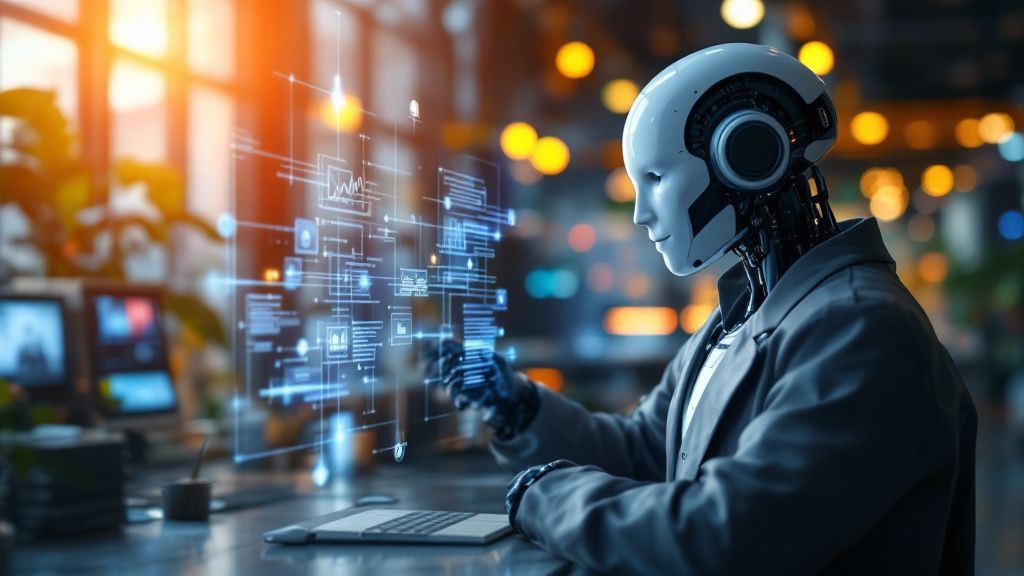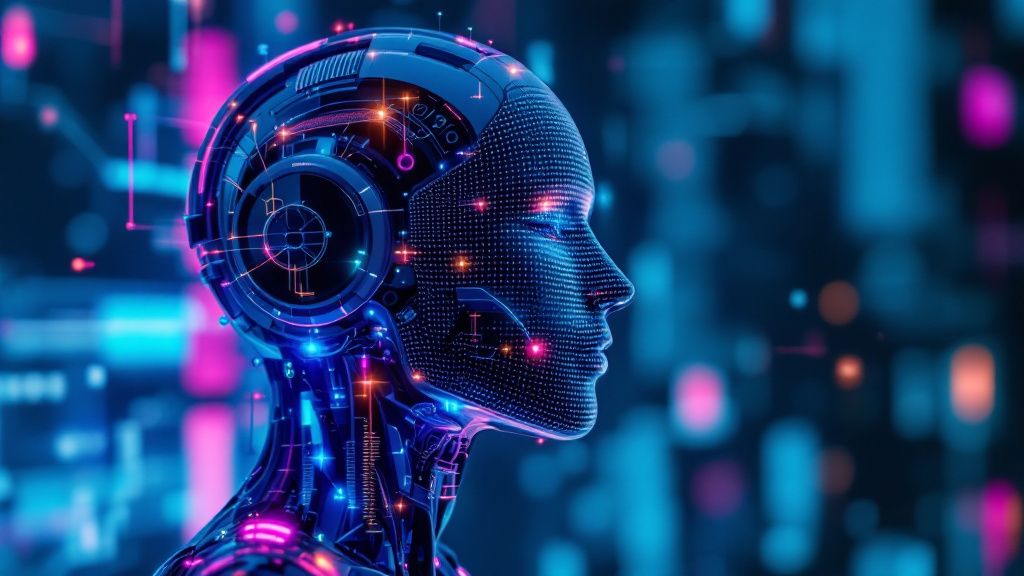Discover the intriguing realm of artificial intelligence—a cornerstone of modern innovation transforming industries worldwide. As you delve into AI, you uncover its capabilities ranging from processing vast data to mimicking human thought processes. This technological marvel is paving the way for advancements across numerous sectors, particularly in its application to business strategies. You witness how businesses are harnessing AI to streamline operations, enhance customer experiences, and remain competitive. As you explore further, the future of artificial intelligence unfolds, promising revolutionary changes, challenging you to consider how implementing AI in business can drive efficiency and growth while shaping the landscape of tomorrow.

Understanding Artificial Intelligence
Artificial intelligence encompasses a wide range of technologies designed to perform tasks requiring human-like intelligence. At its core, AI involves systems capable of learning from data, improving their performance over time, and making decisions with minimal human intervention. You find AI at work in virtual assistants, self-driving cars, and recommendation engines, each demonstrating its diverse applications. These systems often operate quietly in the background, seamlessly integrating into everyday life.
On one hand, some experts view AI as a pivotal force driving technological progress and boosting business efficiency. They highlight the ability of AI to automate repetitive tasks, allowing businesses to focus on higher-level strategies and innovation. However, others caution against an over-reliance on AI, warning of potential job displacement and ethical concerns. This dual perspective underscores the complex role AI plays in society and the economy.
In the business realm, AI applications are revolutionizing decision-making processes. By analyzing mountains of data quickly and accurately, AI empowers companies to optimize operations, predict consumer behavior, and personalize experiences. Implementing AI in business has proven to be a game-changer, offering tangible benefits that help companies gain a competitive edge while navigating an increasingly complex global market. As AI technology continues to evolve, its role in business is likely to become even more integral.
The History of Artificial Intelligence
The concept of artificial intelligence surprisingly dates back to ancient history, with myths and stories of automatons through various cultures. Fast forward to the mid-20th century, you find AI officially taking form as a scientific discipline. Pioneers like Alan Turing laid the groundwork, envisioning machines capable of mimicking human cognitive functions. This period saw the birth of foundational AI concepts, setting the stage for future technological advancements.
During the 1950s and 60s, AI witnessed significant growth as researchers developed early neural networks and created programs that simulated human problem-solving. Progress continued into the late 20th century where AI began influencing industries, albeit with limited impact due to computational constraints. However, the groundwork was established for AI to gradually transform from academic interest to practical applications, particularly in business.
Today, AI has made significant strides, changing how you interact with technology on both personal and professional levels. Looking ahead, artificial intelligence is expected to evolve by adopting more sophisticated algorithms and integrating with emerging technologies. This evolution promises to enhance its capabilities, offering transformative potential for businesses as they adapt to harness AI’s full power in shaping the future landscape.

AI in Everyday Life
Artificial intelligence has become an integral part of everyday life, subtly enhancing various activities you engage in. From using virtual assistants like Siri and Alexa to setting reminders and controlling smart home devices, AI is seamlessly embedded in daily routines. These intelligent systems process natural language and learn preferences, offering personalized experiences that simplify your interactions with technology.
As you shop online, AI-driven algorithms analyze your browsing behaviors to provide tailored product recommendations, improving your shopping experience. Streaming services such as Netflix and Spotify also utilize machine learning to suggest content based on viewing and listening habits. This level of personalization showcases the powerful role AI plays in influencing entertainment choices and consumer behavior.
In the realm of transportation, AI is revolutionizing the way you commute. From ride-sharing apps using AI to optimize routes to autonomous vehicles navigating city streets, the future of artificial intelligence holds promising changes in mobility. These advancements aim to enhance safety, reduce congestion, and offer more efficient travel options, demonstrating AI's profound impact on everyday experiences.

AI in Healthcare
In the healthcare sector, artificial intelligence serves as a transformative force, enhancing diagnostics, treatment planning, and patient care. AI's ability to analyze vast amounts of medical data quickly enables early detection of diseases, improving outcomes and saving lives. Machine learning algorithms assist doctors by identifying patterns in medical imaging, providing vital support in diagnosing conditions like cancer more accurately than ever before.
In treatment development, AI accelerates the discovery of new drugs and personalized therapies. By simulating potential treatments and predicting their effectiveness, AI minimizes the time and cost associated with traditional trial-and-error methods. This significantly contributes to the rapid development of new healthcare solutions, addressing various medical challenges faced by you and healthcare professionals.
What most people don’t see about AI in healthcare is the complex data integration happening behind the scenes that makes all the difference in patient care. AI systems consolidate information from patient histories, clinical studies, and real-world evidence to provide holistic insights. This behind-the-scenes capability enhances decision-making processes, ensuring tailored care plans that are both effective and efficient.
AI is also making strides in administrative efficiency, streamlining paperwork and appointment scheduling to allow healthcare providers more time with patients. Implementing AI in business aspects of healthcare not only reduces operational costs but also improves service quality, positioning AI as a key player in shaping the future of artificial intelligence-driven healthcare.

Artificial Intelligence in Business
Artificial intelligence is revolutionizing the business landscape, offering tools that enhance productivity, efficiency, and decision-making. AI technologies are being implemented across various sectors to automate repetitive tasks and analyze data with unmatched precision. You observe how AI for business reshapes routines, allowing organizations to shift focus from mundane chores to innovative strategies that drive growth and innovation.
AI applications in customer service are becoming increasingly prevalent. When you interact with chatbots or virtual assistants, AI streamlines your experience, providing quick solutions and personalized responses. These tools not only improve customer satisfaction but also optimize business operations by handling inquiries around the clock, demonstrating the efficiency gains AI offers in business contexts.
In the next few years, artificial intelligence is poised to redefine business models entirely, making decision-making processes more intuitive and data-driven. As AI technologies evolve, businesses are likely to see more seamless integration of AI solutions that transform industry standards, adapt to consumer preferences, and foster competitive edges. This bold prediction highlights AI’s potential impact on the future of artificial intelligence in reshaping the corporate world.
Furthermore, businesses are leveraging AI to gain deeper insights into market trends, identifying opportunities that were previously elusive. Implementing AI in business allows for enhanced predictive analytics, translating to strategic advantages and improved financial performance. As AI continues to integrate into business operations, its influence is set to expand, showcasing its vital role in future developments.

Impact of AI on Employment
The integration of artificial intelligence into the workforce significantly impacts employment landscapes across various sectors. While AI automates repetitive tasks, it enables you to focus on creative and strategic responsibilities, thus reshaping job roles. This technological shift requires you to adapt by acquiring new skills, especially those that AI cannot easily replicate, fostering a dynamic workforce prepared for emerging challenges.
AI’s influence on employment is a double-edged sword. On one hand, automation leads to job displacement in certain industries as machines replace routine manual tasks. On the other hand, AI creates new roles, particularly in tech-related fields. This dynamic highlights the importance of reskilling programs that help you transition into roles suited for a future driven by artificial intelligence advancements.
For example, in the manufacturing industry, AI-powered robots handle assembly line tasks with precision and efficiency. While this reduces demand for traditional labor, it spawns new opportunities in robotics maintenance, programming, and oversight. This shift illustrates how AI for business operations in manufacturing evolves employment dynamics, prompting a need for continuous learning and adaptation.
In sectors like healthcare, AI tools assist in diagnostics and patient management, requiring skilled professionals to operate and refine these technologies. Implementing AI in business healthcare contexts enhances efficiency, but also necessitates a skilled workforce to manage and interpret data insights derived from AI systems. This evolution of roles underscores the transforming job landscape.
The future of artificial intelligence broadly points to a collaborative environment where humans and machines work together, complementing each other's strengths. Although AI continues to evolve, integrating its benefits in a balanced manner ensures a workforce that thrives in harmony with technological advancements, ultimately leading to sustainable employment growth and transformation.


.jpg)

.jpg)
.webp)
.webp)
.webp)


.svg)









